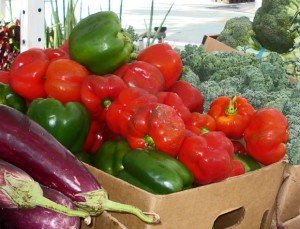 In this second part of the blog post series on shopping at a farmer’s market, I am going to talk about how to know what to choose and come home with foods that are healthy for you.
In this second part of the blog post series on shopping at a farmer’s market, I am going to talk about how to know what to choose and come home with foods that are healthy for you.
We just talked about the first 3 lessons in the previous blog post. They were tips that allow you to know where to find farmers markets and why you should use them.
4. Know what food is in season before you go. Right now, there are lots of foods in season like tomatoes, bell peppers, zucchini and yellow squash. Knowing that those are the items in season, you can go to a farmer’s market and expect good prices on those items. If you want to find out what is in season, go to the USDA What’s In Season website to see a list by spring, summer, winter and fall. It will help you plan ahead and understand why certain foods are priced higher in the grocery store. By choosing food that is in season, you are getting the best nutrients and the freshest food that did not have to be transported here across the ocean or on a train from many miles away.
5. As a diabetic or renal patient, you should understand what foods are going to affect your condition. For diabetics, you need to understand what foods are vegetables and which are fruits. Nectarines are in season now, and they are a fruit. They will affect your blood sugar, but not necessarily in a bad way. They have fiber and it’s a natural sugar, so it should be absorbed more slowly allowing for your body to adjust. But you still need to manage the amount of fruit that you eat. Squash is also in season but it is a vegetable. So it contains less carbohydrate per serving, allowing you to eat more of it as a diabetic. When you are at the farmer’s market, understanding which foods will increase your blood sugars is just as important as it is in the grocery store. While these foods are going to be fresher and better for your body, you still can’t overdo it.
As a renal diet patient, you need to understand what foods are high in potassium and which are low in potassium. You will want to eat less of the high potassium fruits and vegetables – for example, bananas and canteloupes. Choosing squash will help with controlling your diet as well. Take your cheat sheet and ask questions if you don’t know what a certain fruit or vegetable is.
6. That leads me into the last point for today. Talk, talk, talk! Talk to the farmers and understand how they grow their food. How far away do they live? Do they grow it organically? What is coming in season next? Where else do they sell their food? You can learn a lot, and as you come back every week, they get to know you and are ready to help you. They may even offer you a better deal since you are a regular customer. And lots of times they throw in an extra fruit or vegetable to what you have purchased.
Many people think that farmer’s markets are more expensive but it does not have to be. You can get in season items for good prices and talk to the grower’s so you understand how the food is grown. You can learn what is coming into season next and be ready for that food item as well. Getting to know the person who grows your food is a very good thing. So is the understanding of what foods affect your medical condition.
Tell me about a time that you tried a new food or got a great deal at the farmer’s market?
Check out our meal plans that meet the needs of your diet and show you how you can add fresh fruits and vegetables to any meal – click here to get started.
Speak Your Mind